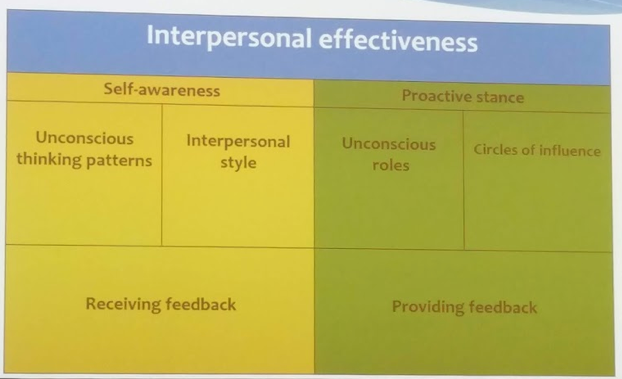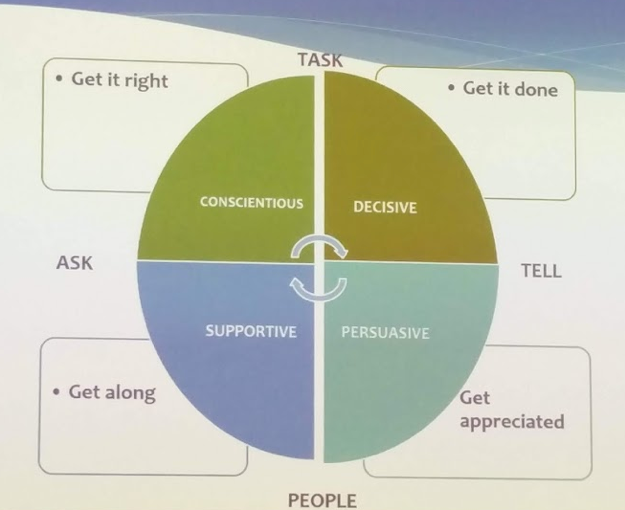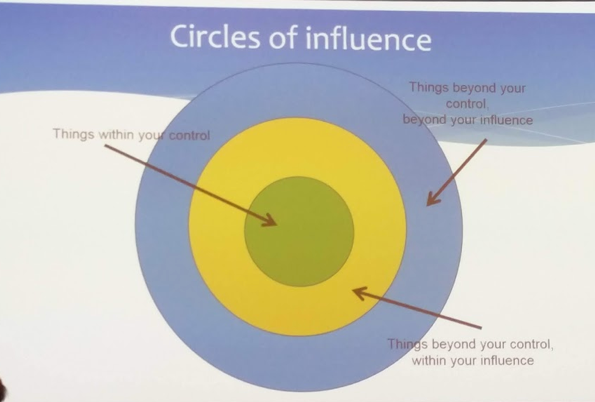His basic assumptions:
1. All leadership starts with a position of self-awareness
2. Knowing is not enough – you must act pro-actively!
3. Leadership is the combination of both the analytical and the emotional perspectives
So interpersonal effectiveness is two-fold: self-awareness and proactive stance. Each of these can be broken down into 3 areas, as below:

The other major point was the concept of intentions and impact. “We judge ourselves by our intentions, we judge others by their impact.” – It’s easy to judge others by their actions, but you should try and make an effort to understand their intentions!
- The developmental task of adulthood is learning how our personal style impacts our relationship with others
- The goal is to match up your intention and your impact on your actual behavior!
- Always ask yourself what your intentions are – and try to act in accordance with those intentions.
How can we enhance our self-awareness?
- Recognize unconscious thinking patterns
- Our behavioral choices are impacted by our unconscious thinking patterns
- He reviewed a few different methods to help understand our unconscious patterns
- These included stories, questions, motives, and mental models – all interesting exercises to help uncover this implicit biases
- Know your own interpersonal style – two different aspects: workstyle and emotional intelligence
- Workstyle – four general workstyles dictated by task-people spectrum and ask-tell spectrum

Where do you stand on this spectrum? No right answer!
But understand that not everyone is in the same quadrant as you – so you need to adjust to working with others.
- Emotional intelligence – a set of emotional and social skills (therefore, inherently something you can learn!) that collectively establish how we perceive and express ourselves, develop and maintain social relationships, cope with challenges, and use emotional information in a meaningful way
- He used Donald Trump as an example of poor emotional intelligence
- EI and IQ are not related – IQ peaks at age 17, EI is not fixed and rises steadily until peaking in late 40’s
- People with high EI are aware of their impact – and that their behavior’s impact may be different from what is intended or expected!
- Receive and pay attention to feedback
- “The biggest communication problem is we don’t listen to understand, we listen to reply” – Troy Stellingwerff
Proactive stance
This requires activating on your self-awareness by:
1. Surfacing your unconscious roles
2. Knowing your circles of influence
- Understand what is within your control and what isn’t – below slide is very important:

- You can affect things in the first two inner circles (things you can control directly or things you can influence), but there are certain things (outer circle) that you cannot change or influence
- Instead of asking “what’s wrong”, ask “what can I/we do about it?”
3. Providing feedback
- In order to maintain a healthy relationship, provide feedback – but do so carefully
- You cannot change others, but you can influence them
His last bit of advice: Optimism!
- The ability to have a positive attitude and outlook on life is a key to good leadership – it involves remaining hopeful and resilient despite occasional setbacks
- Fake it if you need to!
Presented by: Jamie Campbell, Director of Organization Development, North York General Hospital — Toronto, Ontario, Canada
Written By: Thenappan Chandrasekar, MD, Clinical Fellow, University of Toronto Twitter: @tchandra_uromd at the 73rd Canadian Urological Association Annual Meeting - June 23 - 26, 2018 - Halifax, Nova Scotia


